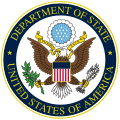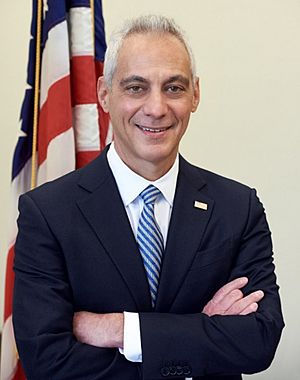List of ambassadors of the United States to Japan facts for kids
Quick facts for kids Ambassador of the United States to Japan |
|
|---|---|

Seal of the United States Department of State
|
|
| Department of State | |
| Style | Mr. Ambassador (informal) The Honorable (formal) |
| Nominator | The President of the United States |
| Appointer | The President
with Senate advice and consent
|
| Formation | November 5, 1859 |
The ambassador of the United States of America to Japan (Japanese: 日本駐在米合衆国大使, Hepburn: Nihon Chūzai Amerika Gasshūkoku Taishi) is the ambassador from the United States of America to Japan.
History
Beginning in 1854 with the use of gunboat diplomacy by Commodore Matthew C. Perry, the U.S. has maintained diplomatic relations with Japan, except for the ten-year period between the attack on Pearl Harbor in 1941 (and the subsequent declaration of war on Japan by the United States) and the signing of the Treaty of San Francisco, which normalized relations between the United States and Japan. The United States maintains an embassy in Tokyo, with consulates-general in Osaka, Nagoya, Sapporo, Fukuoka, and Naha.
Due to the significance of the relations between the two countries in recent years on trade and defense, with Japan being described by the United States State Department as "the cornerstone of the U.S. security interests in Asia," the post has been held by many significant American politicians, including Mike Mansfield, Walter Mondale, Tom Foley and Howard Baker and currently Rahm Emanuel.
List of chiefs of mission
The following is a list of chiefs of mission.
Resident ministers
| Name | Presented credentials | Reason for end of term | Date of end of term |
|---|---|---|---|
| Townsend Harris | November 5, 1859 | presented recall | April 26, 1862 |
| Robert H. Pruyn | May 17, 1862 | Left Japan | April 28, 1866 |
| Chauncey Depew* | N/A | *(commissioned during a Senate recess; declined appointment) | N/A |
| Robert B. Van Valkenburgh | May 4, 1867 | presented recall | November 11, 1869 |
| Charles E. DeLong | November 11, 1869 | promoted to envoy | June 9, 1872 |
Envoys extraordinary and ministers plenipotentiary
| Name | Presented credentials | Reason for end of term | Date of end of term |
|---|---|---|---|
| Charles E. DeLong | June 9, 1872 | Farewell address | October 7, 1873 |
| John Bingham | October 7, 1873 | Presented recall | July 2, 1885 |
| Richard B. Hubbard | July 2, 1885 | Presented recall | May 15, 1889 |
| John Franklin Swift | May 15, 1889 | Died in office | March 10, 1891 |
| Frank Coombs | June 13, 1892 | Presented recall | July 14, 1893 |
| Edwin Dun | July 14, 1893 | Presented recall | July 2, 1897 |
| Alfred Buck | June 3, 1898 | Died in office | December 4, 1902 |
| Lloyd Carpenter Griscom | June 22, 1903 | Left Japan | November 19, 1905 |
Ambassadors extraordinary and plenipotentiary
| Name | Presented credentials | Reason for end of term | Date of end of term |
|---|---|---|---|
| Luke E. Wright | May 26, 1906 | Left Japan | August 13, 1907 |
| Thomas J. O'Brien | October 15, 1907 | Left office | August 31, 1911 |
| Charles Page Bryan | November 22, 1911 | Left office | October 1, 1912 |
| Larz Anderson | February 1, 1913 | Left Japan | March 15, 1913 |
| George W. Guthrie | August 7, 1913 | Died in office | March 8, 1917 |
| Roland S. Morris | October 30, 1917 | Left Japan | May 15, 1920 |
| Charles B. Warren | September 24, 1921 | Left Japan | January 28, 1923 |
| Cyrus Woods | July 21, 1923 | Left Japan | June 5, 1924 |
| Edgar Bancroft | November 19, 1924 | Died in office | July 27, 1925 |
| Charles MacVeagh | December 9, 1925 | Left Japan | December 6, 1928 |
| William Castle, Jr. | January 24, 1930 | Left Japan | May 27, 1930 |
| W. Cameron Forbes | September 15, 1930 | Left Japan | March 22, 1932 |
| Joseph Grew | June 14, 1932 | Left Japan upon US declaration of war | December 8, 1941 |
| George Atcheson Jr.** | 1946 | (**Political advisor to SCAP of ambassadorial rank.) | 1946 |
| William J. Sebald*** | 1947 | (***Chief, Diplomatic Section, GHQ, SCAP - of ambassadorial rank) | 1952 |
| Robert D. Murphy | May 9, 1952 | Relinquished charge | April 28, 1953 |
| John M. Allison | May 28, 1953 | Left office | February 2, 1957 |
| Douglas MacArthur II | February 25, 1957 | Left office | March 12, 1961 |
| Edwin Reischauer | April 27, 1961 | Left office | August 19, 1966 |
| U. Alexis Johnson | November 8, 1966 | Left office | January 15, 1969 |
| Armin H. Meyer | July 3, 1969 | Left office | March 27, 1972 |
| Robert S. Ingersoll | April 12, 1972 | Left office | November 8, 1973 |
| James Day Hodgson | July 19, 1974 | Left office | February 2, 1977 |
| Mike Mansfield | June 10, 1977 | Left office | December 22, 1988 |
| Michael Armacost | May 15, 1989 | Left office | July 19, 1993 |
| Walter Mondale | September 21, 1993 | Left office | December 15, 1996 |
| Tom Foley | November 19, 1997 | Left office | April 1, 2001 |
| Howard Baker | July 5, 2001 | Farewell address | February 17, 2005 |
| Tom Schieffer | April 11, 2005 | Left office | January 20, 2009 |
| John Roos | August 20, 2009 | Left office | August 12, 2013 |
| Caroline Kennedy | November 12, 2013 | Left office | January 18, 2017 |
| Bill Hagerty | August 31, 2017 | Left office | July 22, 2019 |
| Rahm Emanuel | March 25, 2022 | Incumbent | |
See also
- Ambassadors of the United States
- Japanese Ambassador to the United States
- Embassy of the United States in Tokyo
- Embassy of Japan in Washington, D.C.
- Foreign relations of the United States
- Foreign relations of Japan
- Japan–United States relations
- Convention of Kanagawa
- Treaty of Amity and Commerce (United States–Japan)
- Security Treaty Between the United States and Japan
- Treaty of San Francisco
- Treaty of Mutual Cooperation and Security between the United States and Japan
- United States Forces Japan
- U.S.–Japan Status of Forces Agreement


